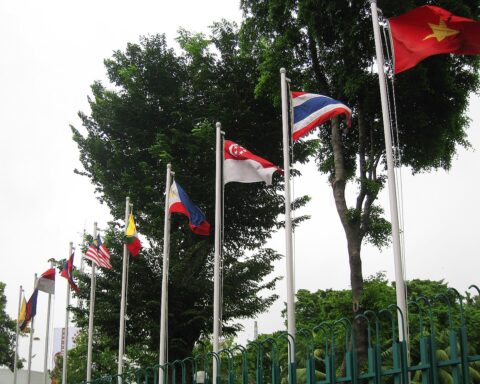Myanmar’s security forces killed at least 38 pro-democracy protesters on Sunday, defying calls by the international community to avoid the use of lethal action against unarmed people.
According to the southeast Asia-based advocacy group, Assistance Association for Political Prisoners (AAPP), 22 anti-coup protesters were killed in the poor, industrial Hlaingthaya suburb of Myanmar after Chinese-financed factories were set ablaze.
Sixteen protesters were killed in other places in the country, including one policeman, making it the bloodiest day since the 1 February coup when the military replaced a democratically-elected government and arrested Aung San Suu Kyi, President Win Myint and others.
However, some reports on social media claimed that the actual number of deaths on Sunday alone was much higher and that the internet was cut-off at many places for hours. They also claimed that, if deaths on Sunday are included, over 50 people were killed during the weekend taking the total number of protesters killed in violence to near 130.
Army-run Myawadday television said security forces acted after four garment factories and a fertiliser plant were set ablaze and about 2,000 people had stopped fire engines from reaching them.
A statement by the Chinese embassy said the country’s staff were injured and trapped in the arson attacks on the garment factories.
“China urges Myanmar to take further effective measures to stop all acts of violence, punish the perpetrators in accordance with the law and ensure the safety of life and property of Chinese companies and personnel in Myanmar,” said a statement by the embassy of China, which has so far appeared to be supportive of Myanmar’s military.
Following this, martial law was imposed in Hlaingthaya and another district of Yangon, state media announced.
Christine Schraner Burgener, special envoy of the United Nation’s secretary-general on Myanmar, strongly condemned the violence by the military in defiance of international calls, including from the UN’s Security Council (UNSC). Ms Burgener called for restraint, dialogue and full respect for human rights and fundamental freedoms.
In a statement, Ms Burgener said that she has personally heard from contacts in Myanmar heartbreaking accounts of killings, mistreatment of demonstrators and torture of prisoners over the weekend.
“The ongoing brutality, including against medical personnel and destruction of public infrastructure, severely undermines any prospects for peace and stability. The international community, including regional actors, must come together in solidarity with the people of Myanmar and their democratic aspirations,” she said.
While Kenneth Roth, executive director of rights group Human Rights Watch, said: “A total 51 were killed over the weekend.”
On 10 March, the UNSC had expressed its “deep concern” on violence in Myanmar against peaceful protestors and asked the military to“exercise utmost restraint.” It had, however, stopped short of advocating any strong international action against the military of the southeast Asian nation.
Tom Andrews, UN special rapporteur on the situation of human rights in Myanmar, said that he is “heartbroken/outraged at news of the largest number of protesters murdered by Myanmar security forces in a single day.”
“Junta leaders don’t belong in power, they belong behind bars. Their supply of cash and weapons must be cut now. I appeal to UN member states to heed my call to act,” Mr Andrews tweeted.
Britain’s ambassador to Myanmar Dan Chugg said the “British government is appalled by the security forces’ use of deadly force against innocent people” while calling an immediate cessation of the violence and for the military to hand back power to democratically elected leaders.
Myanmar’s army had replaced the government just hours before the first day of the parliament claiming fraud in the November 2020 elections even though the charges have been repeatedly denied by the country’s election commission.
In November 2020 elections, Ms Suu Kyi’s National League for Democracy (NLD) won 396 out of the 476 available seats compared to the military-backed Union Solidarity and Development Party that won only 33 seats.
Meanwhile, it has charged Ms Suu Kyi with several cases, including possession of hundreds of thousands of dollars and gold.
Since the coup, the army has repeatedly said that it would only be in charge for a certain period of time before holding new elections but they have not provided a date for the polls.





